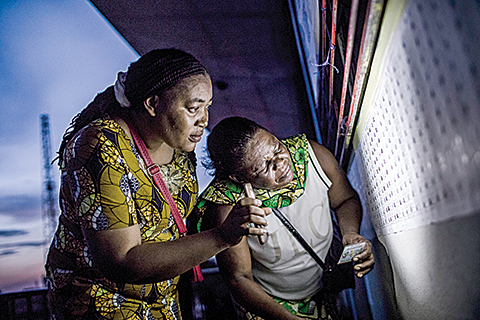
KINSHASA: The
Democratic Republic of Congo yesterday began counting ballots from a
presidential election marked by delays and fears of violence and vote-rigging,
straining hopes for its first-ever peaceful transfer of power. Sunday's
elections went ahead after two years of delays and sporadic clashes in the
unstable country, but the influential national conference of Catholic bishops
declared the vote had been "relatively calm."
Among reported
incidents, some electoral observers were harassed and a clash took in the
restive eastern province of South Kivu that left four people dead. The DRC has
never had a peaceful transition of leader since it gained independence from
Belgium in 1960. Worries of a new spiral into violence deepened after President
Joseph Kabila, in power since 2001, refused to quit two years ago when his
constitutionally-declared limit expired.
Tension and
suspicion were further stoked by
repeated delays, a bloody crackdown on anti-Kabila protests and
accusations that electronic voting machines would help to rig the result. But
Kabila appeared on public television late Sunday to congratulate the Congolese
for having voted "in peace and dignity".
Provisional
results are due to be announced on January 6, final results on January 15 and
the new president sworn in on January 18. From Kinshasa to Goma, 2,000
kilometers further east, polling stations already put up first results on
Monday morning. In Kisangani, the country's third-largest city, observers hired
by the political parties slept on the floor or on desks at a polling station to
keep their eye on the vote count, an AFP reporter said.
Meanwhile, a
spokesman for Catholic Church observers, who were present at 78 percent of
polling stations, said some had been forced to leave the voting centers.
"We had cases where our observers were molested and violated," Luc
Lutala told AFP yesterday morning. On Sunday evening, violence erupted at a
polling station in the Walungu area of South Kivu province after an electoral
official was accused of trying to rig the vote in favour of Kabila's preferred
successor, according to an opposition figure. The electoral official was killed
along with a policeman and two civilians, said Vital Kamerhe, who has been
campaigning for Felix Tshisekedi.
Victory claims
Kabila's champion
Emmanuel Ramazani Shadary declared Sunday to Actualite.cd news site: "I'll
be elected, I'll be president." Separately, Tshisekedi, one of his biggest
rivals and the head of a veteran opposition party, UDPS, predicted:
"Victory is ours." However, the scant opinion polls that have been
conducted in the diverse, sprawling country made Martin Fayulu -- until
recently a little-known legislator and former oil executive -- the clear
favourite.
He garnered
around 44 percent of voting intentions, followed by Tshisekedi with 24 percent
and Shadary with 18 percent, said Jason Stearns of the Congo Research Group,
based at the Center on International Cooperation at New York University. If the
elections are "free and fair," an opposition candidate will almost
certainly win. However, "the potential for violence is extremely
high," he warned. Roughly half of
survey respondents said they would reject the result if Shadary -- a hardline
former interior minister who is facing EU sanctions for a crackdown on
protesters -- was declared winner.
Voting hitches
While turnout
failed to reach 50 percent at some polling stations, many voters said they were
exhilarated at taking part in the first elections after the nearly 18-year
Kabila era. But there was also much evidence of organizational problems,
including with the contested voting machines. The vote for a new president took
place alongside legislative and municipal polls.
A country almost
the size of continental western Europe which straddles central Africa, the DRC
is rich in gold, uranium, copper, cobalt and other minerals. Little of that
wealth trickles down to the poor. Poverty, corruption and government inertia
are etched into the country's history, along with a reputation for violence. In
the last 22 years, it has twice been a battleground for wars drawing in armies
from central and southern Africa. That legacy endures in eastern DRC, where
militias control swathes of territory and battle over resources, wantonly
killing civilians.
Insecurity and an
ongoing Ebola epidemic in part of North Kivu province, and communal violence in
Yumbi, in the southwest, prompted the authorities to postpone the elections
there until March. Around 1.25 million people in a national electoral roll of
around 40 million voters are affected. Despite this, elections in the rest of
the country went ahead. - AFP









